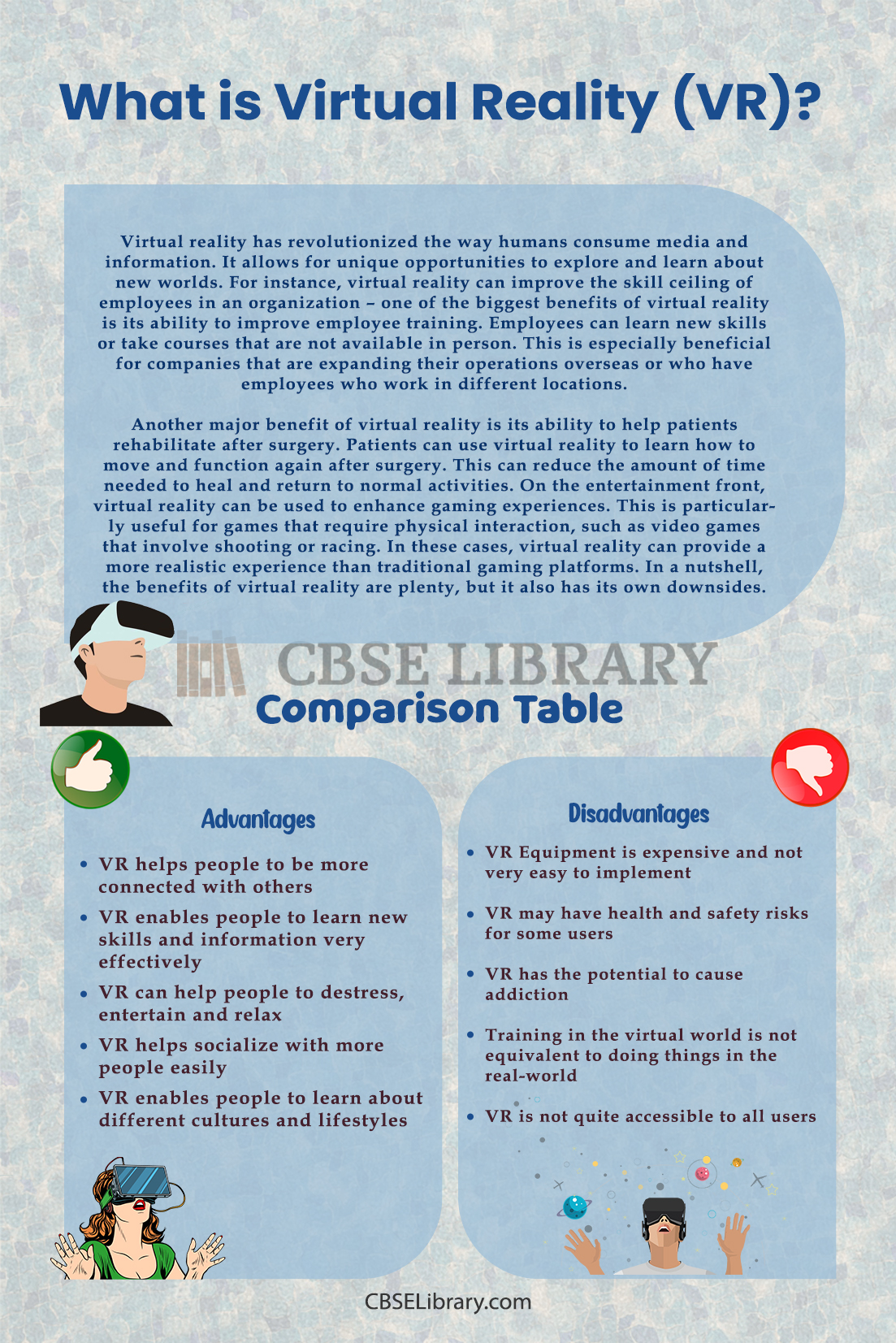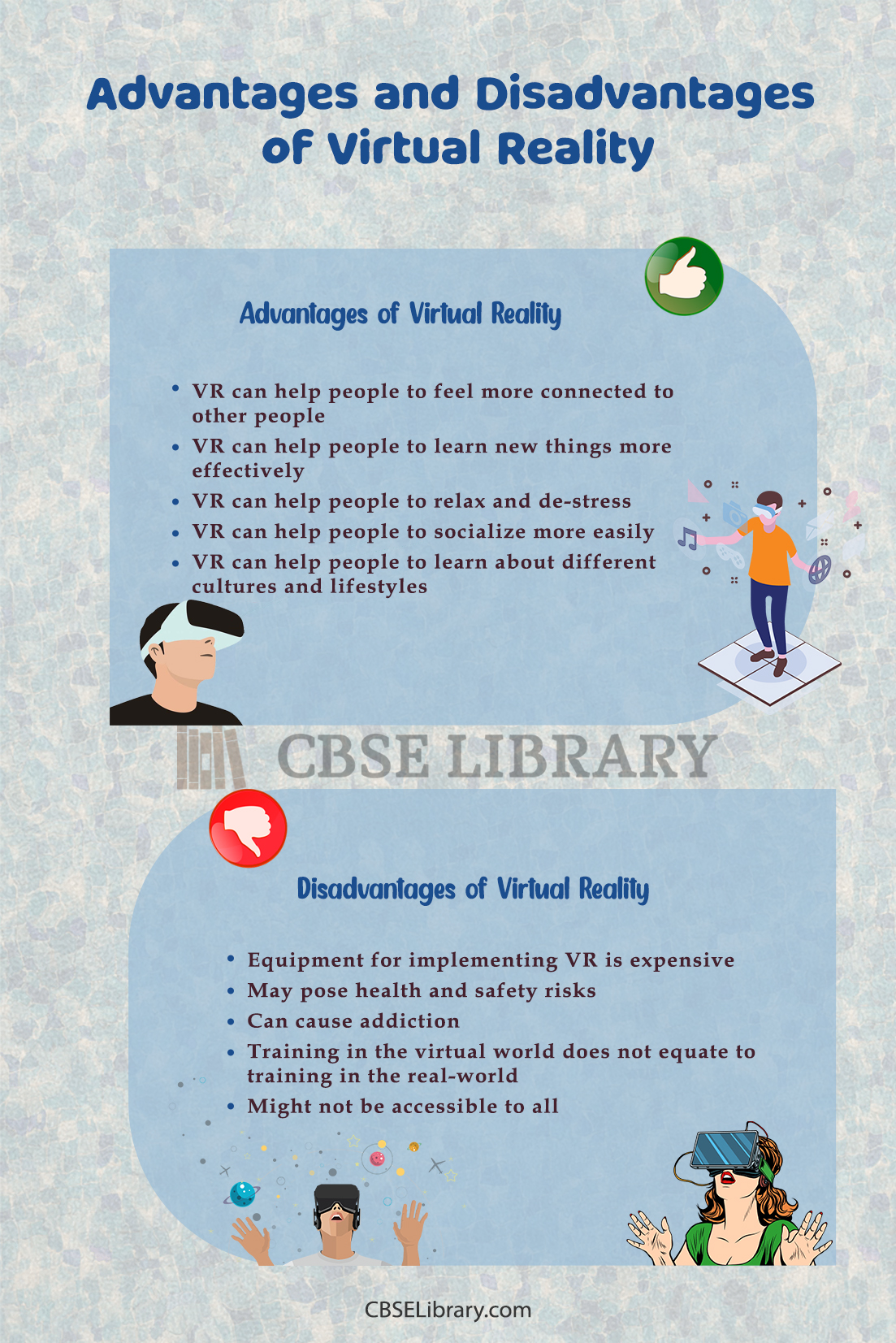Advantages And Disadvantages of Virtual Reality: Virtual reality has revolutionized the way humans consume media and information. It allows for unique opportunities to explore and learn about new worlds. For instance, virtual reality can improve the skill ceiling of employees in an organization – one of the biggest benefits of virtual reality is its ability to improve employee training. Employees can learn new skills or take courses that are not available in person. This is especially beneficial for companies that are expanding their operations overseas or who have employees who work in different locations.
Another major benefit of virtual reality is its ability to help patients rehabilitate after surgery. Patients can use virtual reality to learn how to move and function again after surgery. This can reduce the amount of time needed to heal and return to normal activities. On the entertainment front, virtual reality can be used to enhance gaming experiences. This is particularly useful for games that require physical interaction, such as video games that involve shooting or racing. In these cases, virtual reality can provide a more realistic experience than traditional gaming platforms. In a nutshell, the benefits of virtual reality are plenty, but it also has its own downsides.
Students can also find more Advantages and Disadvantages articles on events, persons, sports, technology, and many more.
- Advantages of Virtual Reality
- Disadvantages of Virtual Reality
- Comparison Table for Advantages and Disadvantages of Virtual Reality
- Conclusion on Virtual Reality – Advantages And Disadvantages
- FAQs on Advantages And Disadvantages of Virtual Reality
Advantages of Virtual Reality
Virtual Reality (VR) has been shown to have a number of benefits that can contribute to human society. Here are five of the most important benefits of VR:
- VR can help people to feel more connected to other people – Virtual reality is a technology that allows people to feel connected with other people. In VR, people are immersed in an entirely new world of their own creation, through the use of headsets and motion-tracking systems. When they move physically or look around, they are also able to see their movements reflected on screen, making it seem as though they are truly there. This can have many positive effects on both the user and those with whom the user interacts.
- VR can help people to learn new things more effectively – There are many advantages to using virtual reality technology. One of the most important is that a person can use virtual reality to learn new things more effectively. The technology is very immersive, to the point where one can study and work in VR without any distractions. This allows people to focus and gives them the ability to learn more efficiently.
- VR can help people to relax and de-stress – Virtual reality has many advantages. The unease and anxiety we experience after a long day can be relieved by stepping into a virtual world. Virtual reality is often touted as a way to de-stress and relax, but it could also help people recover from chronic pain, PTSD symptoms, and even dementia.
- VR can help people to socialize more easily – Virtual reality can help people learn how to communicate with each other more effectively. It’s possible to create virtual worlds where people are able to meet and learn from each other without having to face the physical barriers of being in person.
- VR can help people to learn about different cultures and lifestyles – One of the ways virtual reality has been used in education is for people to learn about different cultures and lifestyles. This can be seen with VR exhibits that take people to the Amazon Rainforest, or to a museum. Virtual reality can also help people to experience what it’s like living in other countries by taking them on immersive journeys from their own home.
Disadvantages of Virtual Reality
Virtual reality is a great invention that has the potential to revolutionize other industries. In the coming years, there is a high probability of virtual reality being used for more than just gaming and entertainment. However, just like any new technology, there are disadvantages that must be taken into account before it is implemented.
- Equipment for implementing VR is expensive – Virtual reality is the next big thing in technology, but that doesn’t mean it’s without its disadvantages. For example, the equipment for implementing virtual reality is very expensive. There are also not many opportunities for people who don’t own a computer or phone to be able to participate in virtual reality.
- May pose health and safety risks – Virtual reality is a relatively new technology, and has only been around for a few years. However, with more and more people using it, many people are still unsure of the safety precautions that should be taken. For example, many people have reported experiencing migraines or even vomiting while using virtual reality. These effects can be minimized by limiting the amount of time spent in VR, but most people tend to spend hours on end in their headset without any breaks.
- Can cause addiction – Virtual reality is becoming a popular new way to experience entertainment and gaming. However, it has its drawbacks. One of the disadvantages is that virtual reality can cause addiction in some people who constantly use it. There are also many reports of problems, such as motion sickness, with this emerging technology.
- Training in the virtual world does not equate to training in the real-world – Training in the virtual world can be effective for some people, but training is a lot different when done in the real world. For example, a video game might teach you how to drive, but it does not give you the same information that a driver’s ed class would. On top of that, driving in front of your computer monitor may not make you as aware of your surroundings as being in the actual car would. Furthermore, people are more likely to get distracted while using VR since they would be staring at their screens instead of looking outside and seeing what is happening around them.
- Might not be accessible to all – Virtual reality can provide a unique experience to someone that it otherwise couldn’t. It allows the user to live out their dreams in the digital world. Almost everyone can benefit from virtual reality in some way. However, not everyone is able to afford it or has access to the technology needed to participate in these types of activities.

Comparison Table for Advantages and Disadvantages of Virtual Reality
Following are the advantages and disadvantages of Virtual Reality:
| Advantages | Disadvantages |
| VR helps people to be more connected with others | VR Equipment is expensive and not very easy to implement |
| VR enables people to learn new skills and information very effectively | VR may have health and safety risks for some users |
| VR can help people to destress, entertain and relax | VR has the potential to cause addiction |
| VR helps socialize with more people easily | Training in the virtual world is not equivalent to doing things in the real-world |
| VR enables people to learn about different cultures and lifestyles | VR is not quite accessible to all users |
Conclusion on Virtual Reality – Advantages And Disadvantages
Virtual Reality has been growing in popularity over the past few years, and there are many advantages that it can offer to society. One of the most important benefits of Virtual Reality is that it can disseminate information and also entertain people. Virtual Reality also has a lot of potential for education. For example, surgeons can use virtual reality to train for surgery without actually having to perform the surgery. This helps to reduce the risk of injuries in the event of a surgical operation.
Virtual Reality also has a lot of potential for entertainment. For example, people can use Virtual Reality to play video games or watch movies. This is an especially good way to keep kids entertained during long hours away from school or on a vacation. However, Virtual Reality has a lot of potential problems and risks, but with everything else, moderation is the key. And it will likely continue to grow in popularity over the next few years, and it will have a significant impact on how we live our lives.

FAQs on Advantages And Disadvantages of Virtual Reality
Question 1.
What is virtual reality?
Answer:
Virtual reality is a technology that has the potential to revolutionize the way people interact with the world around them. It can provide an immersive experience that can be used for a number of purposes, such as training, gaming, and simulation.
Question 2.
What are the advantages and disadvantages of virtual reality?
Answer:
Virtual Reality technology has the potential to provide a number of advantages for human society. However, there are also a number of potential disadvantages that must be taken into account. One of the main advantages of VR is that it can provide a realistic experience that is different from what people are used to. This can improve people’s understanding and appreciation of other cultures and religions. VR can also be used to educate people about different aspects of the world. It can help people learn about history, geography, science, and other subjects. However, there are also several disadvantages to VR. First, it can be difficult to stay in a VR environment for long periods of time. Second, VR can be addictive and lead to negative mental health outcomes. Third, VR may have negative effects on social interactions.
Question 3.
Why is virtual reality important?
Answer:
Virtual Reality allows people to escape from their everyday life and explore the world from an entirely different perspective. It lets you imagine what it would be like to be someone else, go places that are hard to get to, or experience something you might never get the chance to do in real life.
Question 4.
How can virtual reality be used more effectively?
Answer:
Virtual reality is an interactive medium that allows a user to enter multiple realms of simulated computer-generated environments. When looking into different applications of VR, it can be found that the most well-known application is the entertainment industry. Many popular games have been developed with these new virtual worlds in mind. However, there are other potential uses for VR that go beyond just entertainment purposes as well. One particular use of VR technology is using it to help people learn new things more effectively and efficiently than they have been able to before. When students are being taught a new skill or subject in school, they usually undergo long hours of practice over the course of an entire semester. In order to keep up with those expectations and still succeed on tests, many students often tend to forget key points in an instruction manual or quickly lose patience when trying to do something for the first time. The use of VR can allow these students a chance to see how each step works so there isn’t too much confusion about what needs to be done next.
